Palestinian Refugees in Lebanon Are at the Heart of the Struggle and They Must Return Home in 20181/30/2018
Palestinian flags overlook Israeli-occupied Palestine from the Lebanese border. The following is a reflection a member of Black4Palestine on his 2017 work with Palestinian refugees in Lebanon. Read this and other reflections in our 2017 year in review newsletter Zionist forces ethnically cleansed over 75 percent of Palestinians from their land to create their state in 1948. Today it still denies these refugees their right to return to their homelands, and the Palestinian refugees in Lebanon live among the worst conditions across the diaspora. Last year I took two trips to Lebanon to get a better sense of conditions facing Palestinian refugees in the country and of what local work on Black-Palestinian solidarity might look like. Part of my work is sharing the plight of Black people in the US and helping to draw parallels between our experiences. After talking to a family in Burj el Barajneh camp that knew nothing about the Black struggle in the US for five minutes, they all sucked their teeth in disbelief and immediately noted our similarities. In many ways, Palestinians in Lebanon are the “Black” population of the country. Both Palestinians and Black people face exploitation because of discrimination against our racial or national background. A majority of us are poor both because we were dispossessed from our homelands and because our national economies rely on us for cheap labor. In Lebanon, Palestinians are legally barred from working in 70+ professions, largely forced to live in camps with inadequate electricity, water, and sewage, and face an educational system that guarantees they won’t succeed. Palestinian refugees deal with decades of trauma, poverty, and inadequate social services. The camps are seen as violent and ridden with drugs and crime, and most Lebanese avoid the camps like most Americans avoid Black neighborhoods. The camps are often the only places where other marginalized national groups (e.g. Syrians, Iraqis) can afford to live. While many people are disillusioned about the conditions of the camps and the liberation struggle, the camps still feel like Palestine. Generations of people continue to fight for their country and their people. At the Naqab Center for Youth Activities in Burj el Barajneh Camp, youth are given a map to trace the route to return to Akka in ‘48 Palestine from their camps in Lebanon. At the Arab Palestinian Cultural Club in Baddawi Camp, posters honor the martyr Basil Araj, who was assassinated in Palestine by the Zionist military in March 2017 (pictured below). The map of Palestine hangs everywhere—on the inner walls of people’s homes and on the outer walls of the buildings of the camps (pictured below). Palestine’s spirit and life blood continues, even though Zionists have separated the land from its people for 70 years. I had the chance to visit the Lebanese border with “Israel,” guided by a Nakba survivor who could point to the site of his original village from where we were. Israel has denied him and 7 million other Palestinian refugees their ability to go back home for 69 years now. One look at the land and it is clear why the refugees will never abandon their right to return: the camps are an insulting solution to the beautiful, fertile land they know is theirs. In a world where many of us struggle to say what liberation looks like, Palestinians can see it: it is returning to their land and their homes. Palestinian travels are restricted throughout the Middle East. Palestinians from Lebanon can’t visit Jordan or Palestine; Palestinians from Palestine can’t visit Lebanon; many Palestinians from Syria are now double or triple refugees in the Middle East or Europe. This is the essence of Zionist violence to the region: that indigenous populations that could once move freely between Beirut, Damascus, Haifa, Jerusalem and Gaza are now divided and confined to Western-imposed borders. The right to return of all Palestinian refugees is the most basic line that we in the West owe Palestine and we must name it and fight for it every time we talk about it. “End the occupation” is not sufficient unless we’re talking about the occupation of all Palestine, not just the West Bank and Gaza. Right of return is necessary for justice. Please help us make trips like this possible for more people in 2018 by supporting our work.
A member of Black4Palestine with Palestinian youth at the Heartbeats to Palestine camp for youth in Lebanon. In August I had the privilege of traveling to Lebanon to represent Black4Palestine while building solidarity by working as a coach at Heartbeats to Palestine, a sports camp for Palestinian youth. My role at the camp was as a basketball coach, which was dominated by the girls, although there were a handful of boys. The camp serves Palestinian youth that live in various refugee camps, those that live outside the camps, as well as several Lebanese and Syrian youth. As a former athlete, the camp was unlike any sports camp or sports event I have attended as it combined sports with political, cultural and self awareness. Each day involved the youth practicing two different sports (basketball, soccer, running, swimming, and volleyball were all offered) as well as an activity on politics, culture and self-awareness. This helped to bridge the goal of the camp with the sports. One of the main goals of the camp is to move beyond the awareness of the Palestinian right to return and build capacity for the actual return. I gave a talk at the camp for one of the cultural sessions. I spoke about the history of Black4Palestine and the projects we had going on at the time. I also spoke broadly about police brutality and the persistent non-indictment of white officers, stop and frisk, the patrolling of Black communities, and the training of several city police departments by the Israeli military. The youth had a number of questions: Are they still killing you? If the police are doing this then why would some Black people become police officers? How can these things happen when your President was Black? It was a fruitful conversation on several levels. Black US America is not accessible outside of mainstream media so this was an opportunity for the youth to see into our world beyond stereotypes and negative images. There were lots of questions about my hair, our communities, and how we handle interactions with the police. This conversation also opened up conversations about how they were experiencing their own situation. I had a few days before and after the camp to see Lebanon. I was able to spend time in, visit, or go to events in Jadra, Saida, Beirut, Tripoli, Brumanna, Bekaa Valley, and Miniyeh (the site of the camp). My ability to attend and see so much was because of the generosity of my hosts. I would like to see this be something we participate in annually while also building this relationship throughout the year. The only thing that would make this trip better is to send more than one person. Please help us make trips like this possible for more people in 2018 by supporting our work.
Two weeks ago the New Orleans city council passed a resolution focused on divesting from companies that “consistently violate human rights, civil rights, or labor rights.” The council is now backtracking and considering rescinding the resolution due to pressure from Zionist organizations because the New Orleans Palestine Solidarity Committee sponsored the resolution. The following is a letter of support submitted to the council: To the New Orleans City Council:
We are members of Black4Palestine, a national network of Black activists committed to incorporating the Palestinian struggle for freedom, peace and justice into our local and global struggles for Black liberation and human emancipation. Like members of the New Orleans Palestine Solidarity Committee, members of Black4Palestine work on a wide array of issues—including war, the criminalization and imprisonment of communities of color, deportation of migrants and refugees, and discrimination in all forms. We are writing to urge you to maintain Resolution No. R-18-5, which creates a process to keep the city’s investments out of civil and human rights abuses. We must be clear that the sole reason for controversy about this resolution and for the council to even reconsider the measure is Israel’s violation of Palestinian rights. Opponents of the resolution fear this would lead to divestment from human rights violations in Palestine. To rescind the resolution because of Palestine is to throw the millions of people who suffer human and civil rights abuses under the bus due to fear of Israel being held accountable for its well-documented and decades-long violations against Palestinians. And it would say that the defense of human rights applies to everyone, except Palestinians—and by extension that Palestinians are not humans deserving of the same rights and protections as others. It would be inconceivable for the council to rescind a resolution committed to upholding civil, human, and labor rights violations on any grounds—as such an action implies that there are rights violations that are okay to invest in. It is not the job of the council to pretend Israel does not violate Palestinian rights, or to cater to groups that seek to justify these violations. It is the job of the council to examine the facts and determine whether any of the city’s investments “consistently violate human rights, civil rights, or labor rights.” Whether it be through the US-manufactured tear gas canisters used against protesters in Ferguson and the West Bank of Palestine, or through the cement company that builds walls in Palestine and is eager to build Trump’s wall along the Mexican border, the struggles of our communities are inseparable. We incorporate Palestine into our daily and ongoing work for human rights at home because in the words of Dr. King: “Injustice anywhere is a threat to justice everywhere. We are caught in an inescapable network of mutuality, tied in a single garment of destiny. Whatever affects one directly, affects all indirectly.” We urge the council to remain committed to protecting the rights of all humans. Signed, Black4Palestine Members of the Dream Defenders’ August 2017 artist’s delegation to Palestine in front of a Palestinian road closed by the Israeli military in Hebron. The following is a reflection a member of Black4Palestine and the Dream Defenders following a June 2017 visit to Palestine. Read this and other reflections in our 2017 year in review newsletter. In May, I traveled to Palestine for an international gathering to develop a shared strategy for fighting the Israeli weapons industry hosted by Stop the Wall and the American Friends Service Committee. The gathering was held during one of Israel’s largest weapons expos. There were representatives from South Africa, Bosnia, Colombia, Brazil, Palestine and the US - all folks fighting the occupation of Palestine and the impact of Israeli arms and weapons on the destruction of their local communities. This experience made it clear that coming together in the face of an industry that makes money off of military occupation, death and destruction across the world is our only fighting chance at liberation. We literally cannot win without each other. Palestine has been at the forefront of building an internationalist resistance movement and has pushed and inspired me to build the Dream Defenders into an organization that is not only internationalist in our rhetoric, but in our strategy and daily organizing practice. I had been to Palestine once before, and each I was overwhelmed with sadness and anger about the state of the occupation and the suffering and exploitation human beings are forced to face at the hands of the state and corporate elite. In the year between my trips, it was hard to imagine that things could get any worse, but they did. It’s overwhelming to see human beings forced to endure so much, including the many lies that are spread about them in order to justify the killing of their children, the destruction of their homes and the stealing of their land and culture. To witness the power of Palestinians to keep fighting and resisting in the face of this inspires me to do more for our people everyday. The plight of Palestine represents both everything that is wrong about humanity and everything that is beautiful and possible about us too. Our trip to Palestine took place four months into Donald Trump’s presidency. While we know that none of this starts or ends with Trump (or Netanyahu), Trump and Netanyahu are at the forefront of building economies that rely on perpetual war and the destruction of the planet. They are perpetuating a culture that presumes people are innately criminal and terrorist, and that war, death, and incarceration are the only solutions to the problems we face. Then, they profit off of this propaganda. The day after Trump was elected, all of the US stocks plunged except for the private prison corporations and the arms/weapons industry. In the US, 8 major donors have contributed over $57 million since 9/11 to anti-Islam think tanks. These propaganda outlets create financial incentive and ideological justification for the “war on terror,” as well as anti-Palestinian sentiments. In the prison industry, even though crime is falling, the two biggest prison corporations in the US take in annual profits of $3.3 billion. This is also due to a well-funded lobbying and propaganda network that capitalizes on racism. These prison companies are connected to the expansion of policing and militarization of communities around the world. G4S, a company that is profiting off of locking up Black people in the US, is also responsible for beating up indigenous protesters at Standing Rock fighting for our collective right to clean water, and is also responsible for detaining, torturing and deporting immigrants. This same company provides services and equipment to Israeli prisons, checkpoints, police and the Apartheid Wall. It is on us to resist the systems this society is rooted in - racism, imperialism, capitalism - and to end use of prisons, weapons, and war in the name of “security” and “peace.” Coming back from Palestine after this experience made me realize we need to build a mass movement against the defense industry, a movement that fights the propaganda spread about our communities to justify the industry’s existence. On a fundamental level, we must help everyday people realize that they should not be scared of one another as human beings and that they must start looking up at the people who are profiting from our fear and suffering. We cannot become complicit in the world they are building. We have a responsibility to envision a new world, and a new way of being in relationship with one another and the land which we stand upon. We must not only unite around the commonality of our oppression, but around a common vision for liberation. When we do this, the vision becomes larger than ending the weapons trade or police killings of Black people, larger than tearing down the wall between the US and Mexico or the wall in Palestinians. Our movement becomes a struggle rooted in a new vision for humanity. Please help us make trips like this possible for more people in 2018 by supporting our work
2017 Reflection: African & Palestinian Solidarity is Key to Ending Zionism and Colonialism1/12/2018
Photo courtesy of Black-Palestinian Solidarity The following is a reflection from Black4Palestine member LiT following a June 2017 visit to Palestine. Read this and other reflections in our 2017 year in review newsletter. When I returned from my first trip to Palestine, I was filled with rage. I saw Palestinians fighting a three layered assault: they are separated (apartheid), dehumanized, and killed (genocide). I saw parallels between Palestine and what I learned Turtle Island (America) looked like in the first 100 years of European colonization. The Zionist’s illegal kidnapping, detainment, torture, and murder of Palestinian people and their extraction and dispossession of land and natural resources parallel the attacks on indigenous people on Turtle Island and the formation of the United States. Connecting my work with indigenous groups on Turtle Island, other African descendants, and anti-colonial struggles across the world, I look back to the Balfour Declaration - Britain’s declaration of support for a Zionist state in Palestine in 1917. The issue of Palestine is not 50 years old, but over 100 years old. So it is not enough to be anti-occupation, we have to be anti-zionist and anti-colonialist. It is not enough to end the occupation, but we must support and secure the right to return for all Palestinian refugees. We must be clear that all of “Israel” is occupied Palestinian land, not just the West Bank and Gaza. During my time in Palestine I formulated grounding principles that frame my definition of liberation:
In spite of intense Zionist violence, Palestine remains beautiful. The morning I left Palestine, two young boys saw me waiting for the bus to Qalandia checkpoint. They asked where I was going and after I told them to the airport, they walked away and returned with flowers offering “something to remember us and our land.” I felt despair when I first got back, but then I realized there’s no time for that - we must get to work. Palestinians and Native Americans share two sides of the same story, via Settler deCOLONIZATION (Facebook) Please help us make trips like this possible for more people in 2018 by supporting our work.
Over the past two years, we've done internal work to build our network, issued statements, spoken at conferences and rallies, and traveled abroad to the Middle East and Africa for solidarity work.
As we move into 2018, we are happy to share our 2017 year in review newsletter below. Inside you'll find an overview of the local and national work we did last year, reflections on trips our members have taken to Lebanon, Palestine, and South Africa, a reprinting of our statements of support for the Freedom & Dignity hunger strike and against the attacks on Jerusalem. We dedicated this issue to Rasmea Odeh, whose tribute you'll find in the center of the document. You will also find our goals for 2018, which include solidifying our national organizing network, hosting regional gatherings across the country, publishing and printing educational resources geared towards Black people about Palestine, and continuing our international solidarity work by visiting the Middle East and Africa and inviting speakers here. Please help make our work possible in 2018 by contributing here. If you have trouble viewing the newsletter below or would like a printable version, click 'Download File':
Black4Palestine 2017 Newsletter by Black4Palestine on Scribd |
|||||||
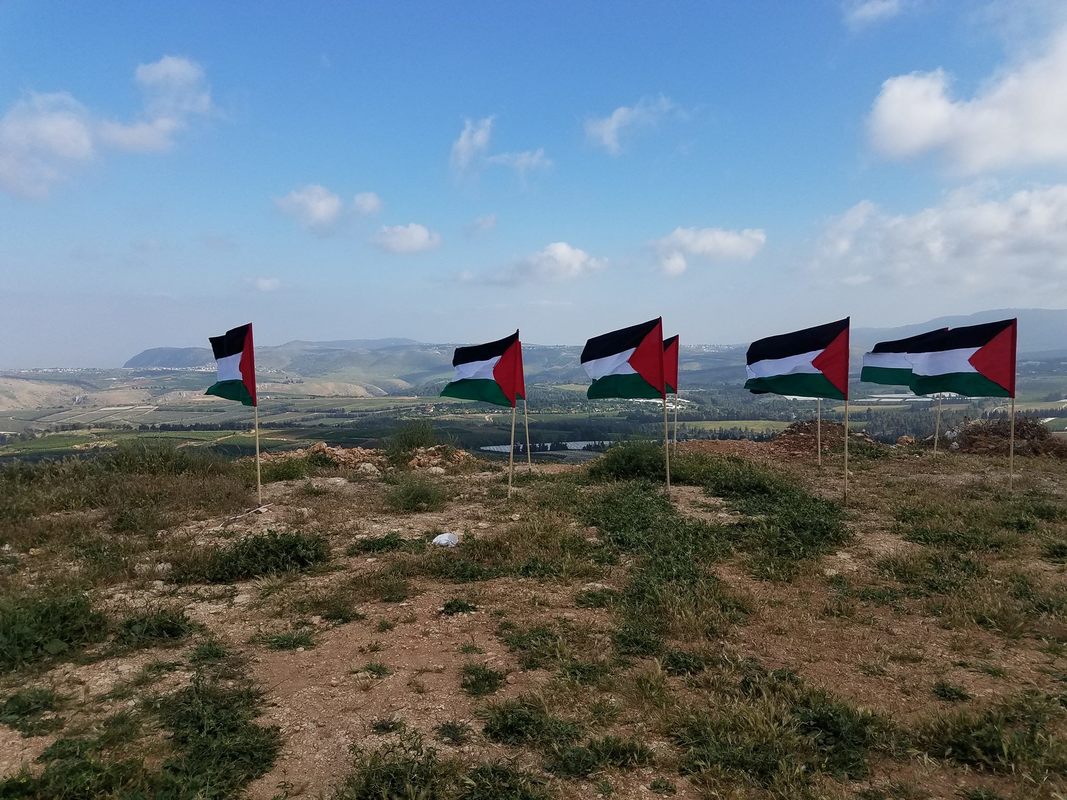
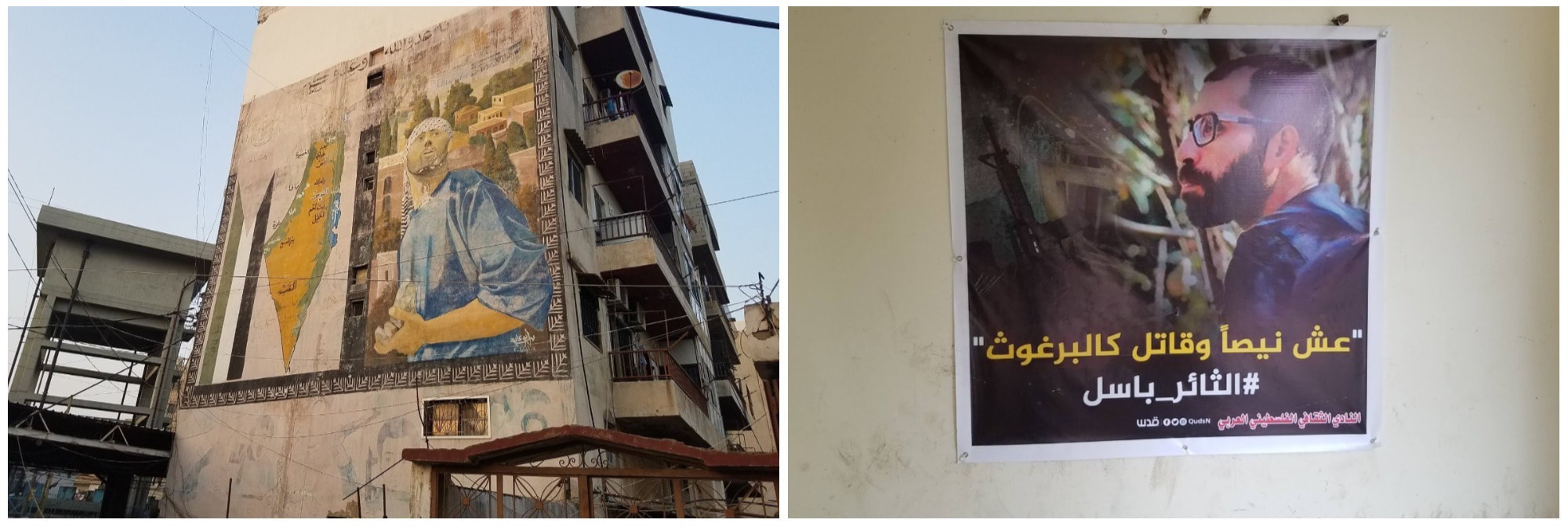
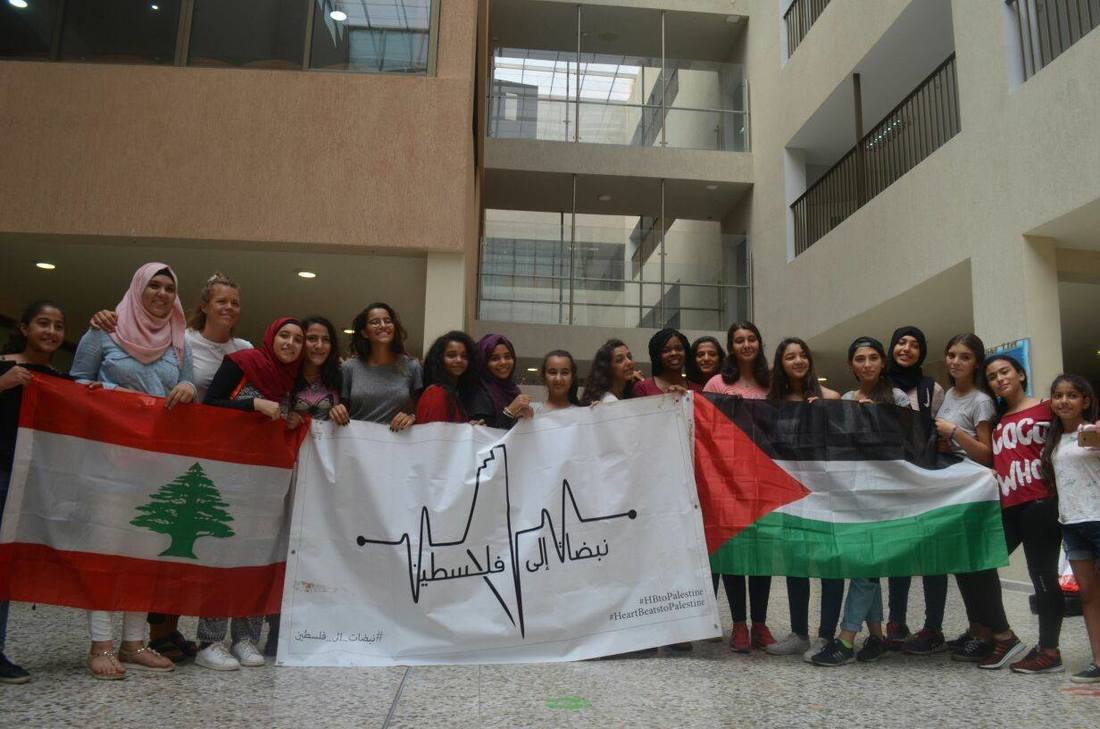
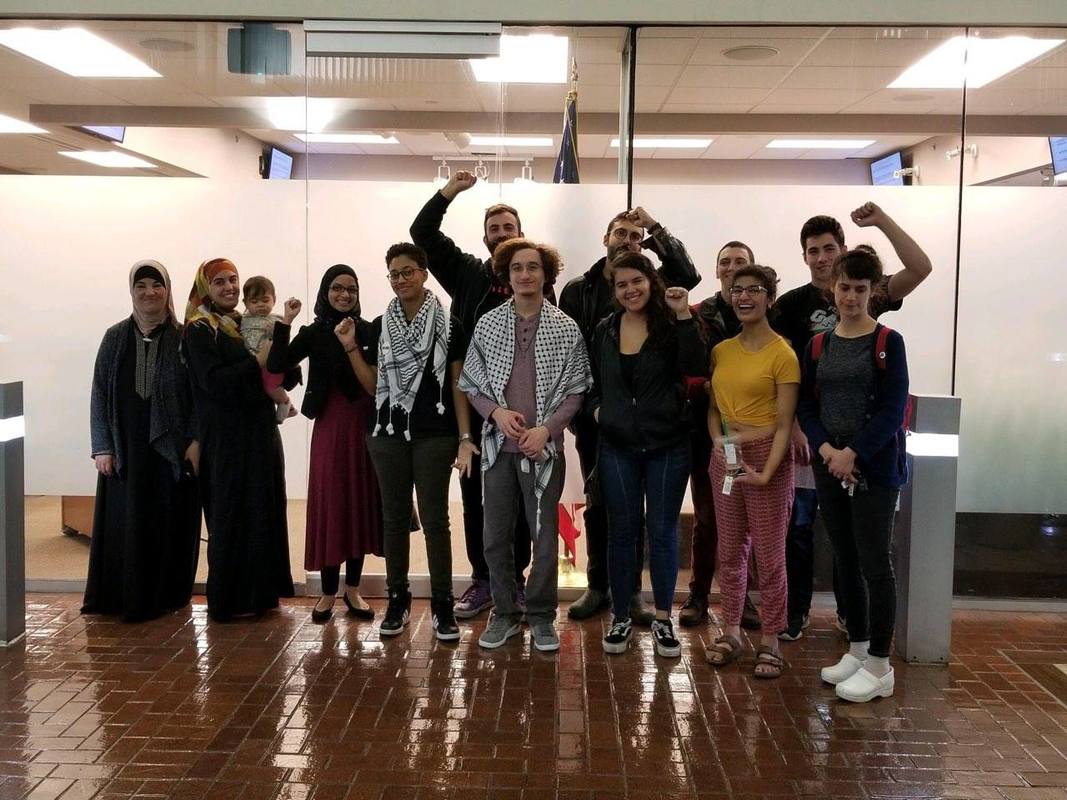
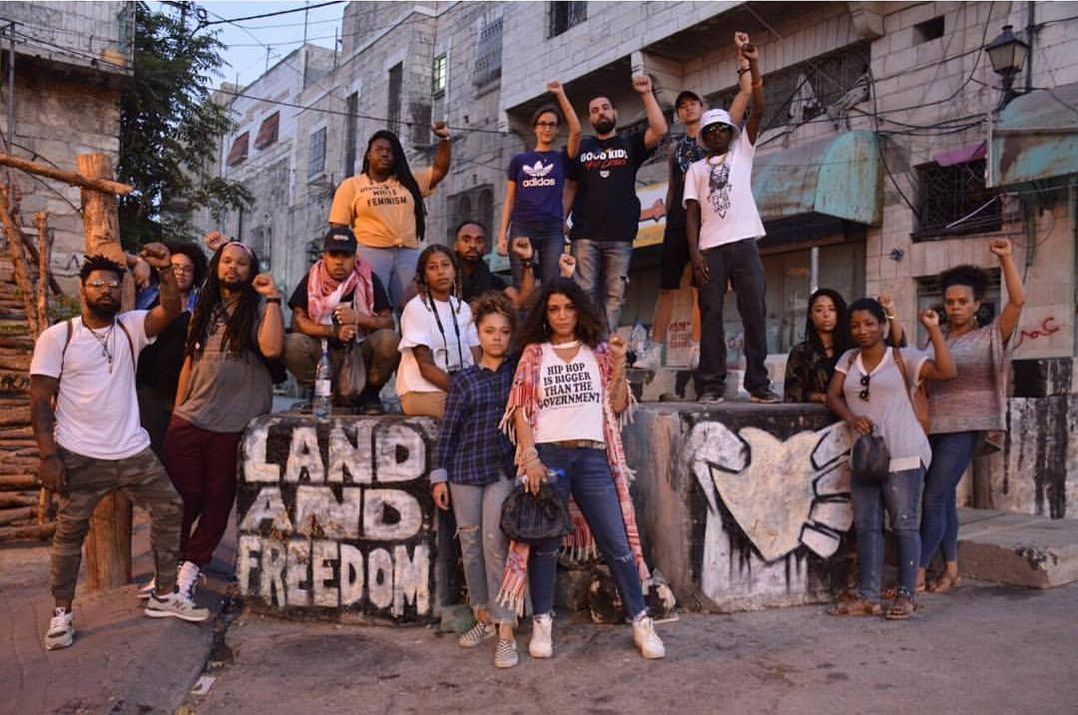
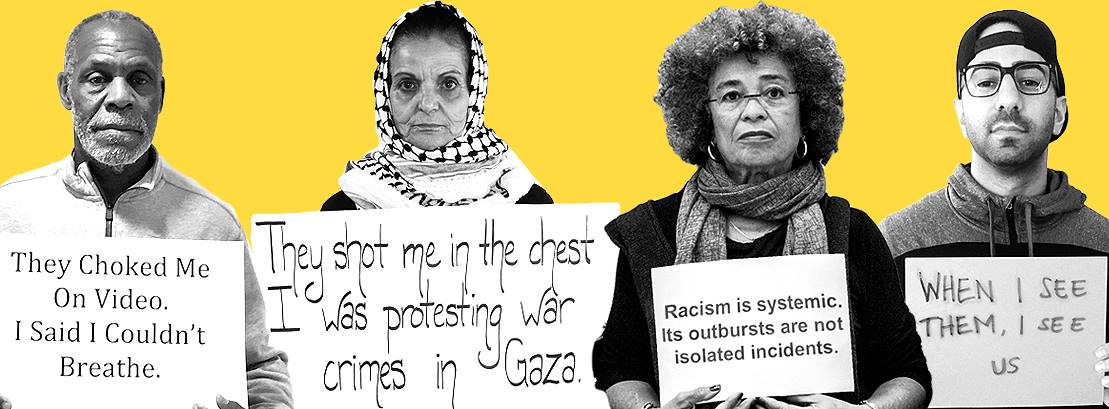
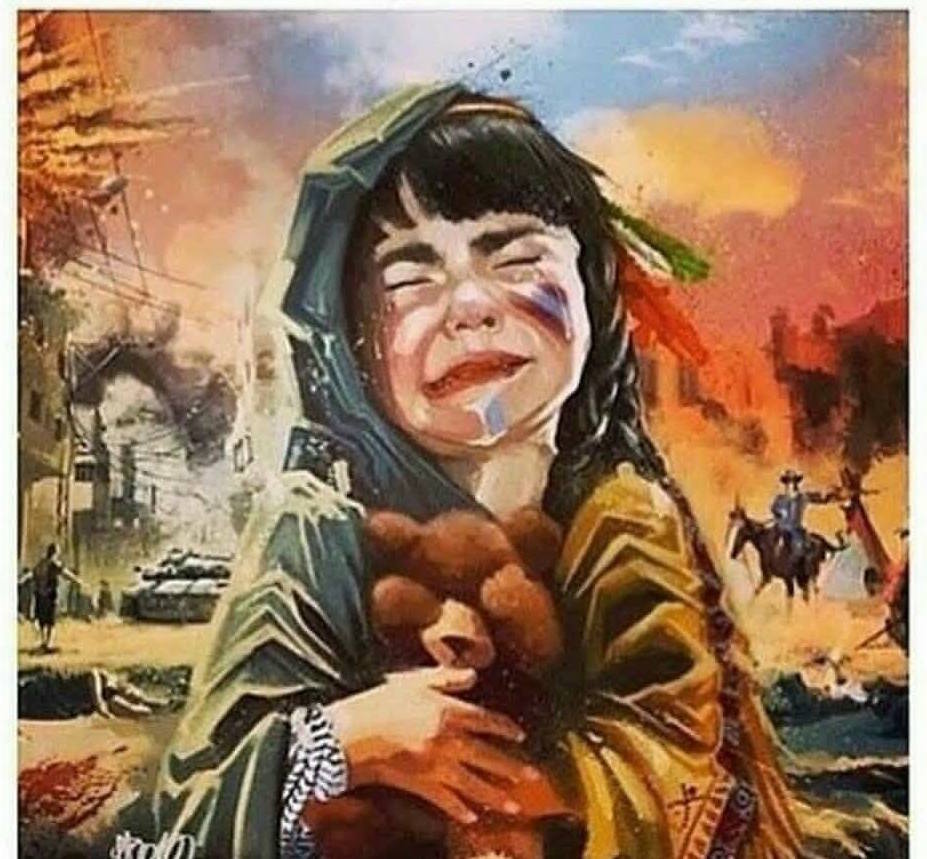
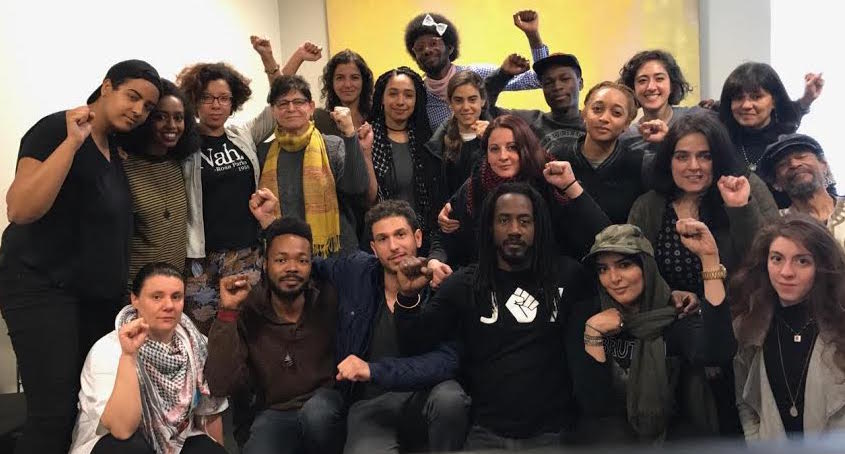
 RSS Feed
RSS Feed